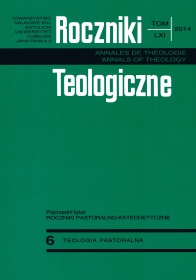Psychological Aspects of Preaching
Abstract
The article aims at presenting some psychological aspects of sermons. To every stage of homiletical communication between preacher and hearers are quoted suitable psychological theories and models useful to homiletical theory and practice. There are presented as follows: a theory of creativity using in the sermon preparation process, the typology of preachers on the basis of on tape recorded sermons, the sermons making on the model of learning process, a sermon reception in the context of object relation theory (meaning of the sermon in relation to God image, personality, and affective state), as well a therapeutic and destructive influence on hearers. As the background for that issues the author refered to many studies on the subject.
References
Arens H.: Die Predigt als Lernprozess. München: Kösel 1972.
Arens H., Richardt F., Schulte J.: Kreativität und Predigtarbeit. München: Claudius 1977.
Bukowski P.: Predigt wahrnehmen. Homiletische Perspektiven. Neukirchen−Vluyn: Neukirchener 1990.
Chaim W.: Kazanie jako komunikat. W: Fenomen kazania. Red. W. Przyczyna. Kraków: Poligrafia Salezjańska 1994 s. 98-135.
Chaim W.: Skuteczność rekolekcji dla młodzieży. W: Rekolekcje dla dzieci. Red. W.Przyczyna. Kraków: Poligrafia Salezjańska 1996 s.337-360.
Chaim W.: Kaznodzieja jako terapeuta. W: Sługa Słowa. Red. W. Przyczyna. Kraków: Poligrafia Salezjańska 1997 s. 165-180.
Chaim W.: Psychologiczny aspekt recepcji kazań. Przegląd badań empirycznych. „Analecta Cracoviensia” 29:1997 s. 17-31.
Chaim W.: Psychoanalityczne ujęcie charakterologicznych uwarunkowań słuchania słowa Bożego. W: Słuchacz Słowa. Red. W. Przyczyna. Kraków: Poligrafia Salezjańska 1998 s.144-162.
Chaim W.: Dlaczego nie przychodzą? Psychologiczne uwarunkowania absencji młodzieży na rekolekcjach. W: Trzymajcie się mocno Słowa Życia. Red. W. Przyczyna. Kraków: Poligrafia Salezjańska 1999 s. 9-23.
Chaim W.: Psychologiczny aspekt recepcji kazań. Przegląd teorii. „Ateneum Kapłańskie” 133: 1999 nr 1 s. 3-14.
Chaim W.: Psychologia w homiletyce XX wieku. „Analecta Cracoviensia” 32:2000 s. 3-17.
Chaim W.: Recepcja przekazu religijnego. Metody badań. Referat. 31 Zjazd PTP. Lublin 2002.
Chaim W. Toksyczni kaznodzieje? W: W trosce o dobrą filozofię. Red. M. Pawliszyn, M.Urban. Kraków: Homo Dei 2007 s. 335-353.
Chaim W.: Osobowość kaznodziei. W: Psychologiczne i pastoralne aspekty kapłaństwa. Red. B. J. Soiński. Poznań: RW WT UAM 2008 s. 175-204.
Chaim W.: Typy psychologiczne w recepcji i przekazie słowa Bożego. „Roczniki Pastoralno-Katechetyczne” 60:2013 z. 5 s. 155-170.
Crowe J. M.: Preaching to cultivate a whole-person response in developing a healthy church. Diss: Asbury Theological Seminary 2001.
Dannowski H. W.: Kompendium der Predigtlehre. Gütersloh: Mohn 1990.
D e Blassie P.: Toxic Christianity: Healing the Religious Neurosis. New York: Crossroad 1992.
Denecke A.: Persönlich predigen. Anleitungen und Modelle für die Praxis. Gütersloh: Mohn 1979.
Engemann W.: Persönlichkeitsstruktur und Predigt. Homiletik aus transaktionsanalytischer Sicht. Leipzig: Evangelische Verlagsanstalt 1992.
Engemann W.: Predigt als Schöpfungsakt: Zur Auswirkung der Predigt auf das Leben eines Menschen. http://egora.uni-münster.de/fb1/pubdata/Engemann_08a_Predigt_als_Schöpfungs-akt.pdf
Francis L. J.: Psychological type and liturgical preaching: The SIFT method. „Liturgy” 21:2006 nr 3 s. 11-20.
Francis L. J., Village A.: Preaching with all our souls: a study in hermeneutics and psychological type. London: Continuum 2008.
Francis L. J., Robbins A., Village A.: Psychological type and the pulpit: an empirical enquiry concerning preachers and the SIFT method of biblical hermeneutics. „HTS Theological Studies” 65:2009 nr1 s. 171-177.
Francis L. J., Jones S. H.: Reading and proclaiming the resurrection. An empirical study in psychological type theory among trainee and experienced preachers employing Mark 16 and Matthew 28. „Journal of Empirical Theology” 24:2011 nr 1 s.1n.
Grözinger E.: Kreativität in der Predigtarbeit. Waltrop: Spenner 2001.
Händler O.: Die Predigt. Tiefenpsychologische Grundlagen und Grundfragen. Berlin: Alfred Töpelmann 1949.
Holleyman E. M.: The impact of personality on preaching: an investigation of the correlation between Meyers-Briggs personality types and the preaching experience (Diss.). New Orlean: New Orleans Baptist Theological Seminary 1991.
Jackson E. N.: The therapeutic function in preaching. „Pastoral Psychology” 1:1950 nr5 s.36-39.
Kołodziejczyk J.: Postawy religijne a recepcja kazań. W: Kościół w służbie człowieka. Red. W. Turek, J. Mariański. Olsztyn: Warmińskie Wydawnictwo Diecezjalne 1990 s. 317-330.
Kretz H.: Die destruktive Predigt. „Wege zum Menschen” 20:1968 s.207-210.
K r o k D.: Perswazja w przekazie religijno-moralnym. Opole: WT Uniwersytetu Opolskiego 2005.
Mc Lennan D. A.: Preaching and pastoral counselling are one task. „Pastoral Psychology” 1952 nr 2 s. 16-20.
Lewek A.: Uwarunkowania recepcji kazań. W: Bóg − Człowiek − Ojczyzna. Kazania. T.6. Red. A. Lewek. Warszawa 1990 s. 7-22.
Lerle E.: Arbeiten mit Gedankenimpulsen. Berlin: Evangelische Verlag Anst. 1965.
Müller K.: Homiletyka na trudne czasy. Kraków: Wydawnictwo „M” 2003.
Piper H.-Ch.: Predigtanalysen. Kommunikation und Kommunikationsstörungen in der Predigt. Göttingen: Vandenhoeck & Ruprecht 1976.
Ramsey G. L.: Care-Full Preaching: From Sermon to Caring Community. St. Louis, Mo: Chalice Press 2000.
Rebell B.: Psychologisches Grundwissen für Theologen. Ein Handbuch. München: Chr. Kaiser 1988.
Riemann F.: Die Persönlichkeit des Predigers in Tiefenpsychologischer Sicht. W: Perspektiven der Pastoralpsychologie. Red. R. Riess. Göttingen: Vandenhoeck & Ruprecht 1974 s.152-156.
Schaap - Jonker H.: Before the face of God: an interdisciplinary study of the meaning of the sermon and the hearer's God image, personality and affective state. Münster: LIT Verlag 2008. http://www.hannekeschaap.nl/Summary.pdf [dostęp: 27.05.2014].
Schulz v o n Thun F.: Was geschieht, wenn wir predigen? Kleines Kommunikationspsychologisches Kolloquium. „Bibel und Liturgie” 62:1989 nr 4 s.201-211.
Schulz v o n Thun F.: Sztuka rozmawiania. Analiza zaburzeń. Kraków: WAM 2001.
Siwek G.: Proces tworzenia kazania. W: Fenomen kazania. Red. W. Przyczyna. Kraków: Poligrafia Salezjańska 1994 s. 197-201.
Siwek Z., Zarębska - Piotrowska D.: Psychologia twórczości. Wybór tekstów. Kraków: Wydawnictwo UJ 1984.
Thilo H.-J.: Psyche und Wort. Aspekte ihrer Beziehungen in Seelsorge, Unterricht und Predigt. Göttingen: Vandenhoeck & Ruprecht 1974 s. 104-129.
Trautwein D.: Lernprozess Gottesdienst. München: Pfeiffer 1972.
Twardy J.: Przygotowanie kazania jako proces twórczy. „Współczesna Ambona” 22:1994 nr 4 s. 98-109.
Village A., Francis L. J.: The relationship of psychological type preferences to biblical interpretation. „Journal of Empirical Theology” 18:2005 nr 1 s. 74-89.
Wallner A.: Werkbuch Predigt. Im Dialog mit der Gemeinde. Graz−Wien−Köln: Styria 1989.
Copyright (c) 2014 Roczniki Teologiczne

This work is licensed under a Creative Commons Attribution-NonCommercial-NoDerivatives 4.0 International License.





